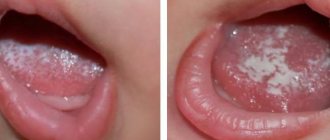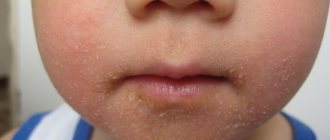A strong and healthy night's sleep is very important for a small child. Many important processes occur during sleep. In particular, the growth of the baby. And if a child does not sleep well, then this cannot but worry a loving mother. The woman begins to look for the true reasons for the child’s poor sleep, not wanting to put up with this state of affairs, but figuring it out is not so easy. However, the reason is still worth finding out. After all, unhealthy sleep can lead to bad consequences.
Causes of restless sleep
Causes of childhood sleep disturbances:
- Changes in the functioning of the brain centers responsible for sleep and wakefulness.
- Pain or discomfort.
When a child sleeps, his body rests. Sleep is also necessary for assimilation of information received during wakefulness. Therefore, infants need more time to rest than children after one year.
Restless sleep in a newborn can be caused by:
- Difficulty breathing. This occurs due to nasal congestion or too dry air in the house, which contributes to swelling of the mucous membrane and the formation of “crusts”.
- Congenital features such as a non-fused palate or allergic diseases.
- Infectious diseases of the nasopharynx, including gastroesophageal reflux, which can cause bronchial spasms.
- Lack of vitamin D3 due to lack of sunlight. Wet feet and palms in a baby from 6 months of age are the first sign of a deficiency of this vitamin. Lack of vitamins is especially felt by children born in autumn, winter or early spring.
- Congenital anomaly in the form of narrow nasal passages. They expand as the baby grows, but sometimes surgical intervention is required.
- Lactase deficiency. This is a disorder of lactose breakdown, which often affects children under one month of age. Milk sugar is poorly broken down by the intestinal microflora, which causes regurgitation, bloating and night colic.
- Segmental motor automatisms or the first Moro phase. When a child throws his arms to the sides at sudden sounds or changes in position, he may wake up and cry. In such cases, a special pillow helps. If the situation is observed in a child 5 months or older, then he has increased excitability, a consultation with a neurologist is needed.
- Reflex reactions. After 6 months, children have a very strong desire to get up and walk, and the brain can send a command to the muscles to do this even in their sleep. Therefore, babies often sit down and even stand up while sleeping, which causes them to wake up and scream.
- Formation of the urination reflex. By 9 months of age, children understand that they want to urinate, but cannot figure out how to do it. Therefore, the child spins, wakes up and cries until this happens by itself.
- Failure to maintain drinking balance. Starting at 6 months, the child may not eat or drink for up to 6 hours. Therefore, from this age there is no need to give food to the baby at night, giving the stomach and kidneys proper rest. You can calm a baby who wakes up at night by rocking him to sleep or using a pacifier.
- Various somatic diseases. Dermatitis, colic, acute respiratory, viral infections or other diseases not related to neurology.
Poor night sleep in a healthy baby
It is best to formulate a routine for your baby during the newborn period. Of course, you won’t be able to do this until you’re a month old, because at this age wakefulness and sleep are chaotically mixed. But even in this case, there may be a semblance of a regime: the baby eats, then stays awake a little and after a short time falls asleep, waking up before the next feeding. At this age, nothing can disturb the sleep of a healthy baby except hunger, wet diapers and tummy pain due to gas. You can fix these problems.
- There are now many effective remedies for stomach pain These same drugs also have a prophylactic method of use, preventing the formation of gases. You can also brew fennel seeds yourself (1 tsp per glass of boiling water), leave for a while and give your child this infusion, an excellent preventive measure.
- If the baby wakes up from hunger , then feed him. If the baby regularly does not eat enough and for this reason wakes up, then reconsider the feeding regimen.
- If your baby's diaper is full , change it. It happens that a baby feels uncomfortable in diapers from one manufacturer and behaves fine in another.
- Poor night sleep in a healthy child from 3 months to a year
- If your baby has nervous overexcitement due to active games, fear, various impressions after a long day, then, of course, it is necessary to eliminate all these reasons from your child’s routine.
- An older baby, just like a newborn, can have a tummy ache and disturb his sleep. Gas medications are the same as for a newborn baby.
- A child can be very worried about growing teeth , and they can cause anxiety several months before teething, be patient and some kind of painkiller, for example, Kalgel or Kamestad, you can also Dentokind, but this is from homeopathy. Another excellent homeopathic remedy that has an analgesic effect is Viburkol suppositories.
Another factor similar to the reason for poor sleep in newborns is a full diaper . Now there are good companies in whose diapers a baby can sleep all night without problems, if he doesn’t decide to poop in the middle of the night, but usually with age, babies begin to perform this process in the middle of the day. Use these whenever possible.- If a child screamed in his sleep, but did not wake up, then it is quite possible that he is worried about the feeling of hunger , in this case, give him some water to drink from a bottle, or from the breast if you are breastfed.
- It happens that a baby spends little time during the day in contact with his mother, then the consequences will be reflected in night sleep, as a lack of tactile contact . The baby will demand the mother's presence during sleep. To avoid this, take your baby in your arms more often while he is awake.
- And another important point - the air humidity in the room where the child lives should not be lower than 55%, and the temperature should not be higher than 22 degrees.
If all the rules are followed, the causes of poor sleep are eliminated, but sleep does not improve, then it is possible that the child is sick. Most often these are infectious and viral diseases (influenza, acute respiratory infections or acute respiratory viral infections, various childhood infections). Less commonly, helminthiases, dysbacteriosis, or congenital diseases (brain tumors, hydrocephalus, etc.). In any case, consultation and examination with doctors, and further treatment are necessary.
Baby winces in his sleep
If a baby sleeps restlessly and shudders at night, this is not a deviation and definitely not a pathology. In many cases, this is a reaction to external stimuli. Since the hearing organs of a newborn child are not yet formed, he reacts emotionally to sharp sounds and smells. Babies also pass gas, which can also make them startle in their sleep.
In order for the child to adapt to the new world quickly and painlessly, you should not talk in a whisper or, conversely, in a raised voice when he is sleeping.
You need to conduct a dialogue in the presence of a sleeping child calmly, then he will get used to the timbre of the parents’ voice and will not wake up from speech.
Reviews from young mothers
Irina:
My son is now 7 months old. Periodically he sleeps very poorly, just as you describe. There were times when I fell asleep during the day for 15-20 minutes. Many children under one year old sleep like this. Their regime is changing. Now we have more or less a regime during the day. I started feeding him formula instead of breastfeeding at night. I started sleeping better. In the middle of the night I also supplement with formula. Then he falls asleep instantly. And if I give breasts, I can hang on them all night. Try also to feed him better at night, or put him to bed during the day after 2-3 hours of wakefulness. In general, adapt to your child :)
Margo:
I advise you to get tested for helminth eggs or parasites. They often cause a child’s nervousness, poor mood, sleep and appetite. My niece always had this condition at one time. As a result, they found Giardia.
Veronica:
It’s worth trying to tire your child out during the day. With an 8-month-old baby this is not very easy, compared to a child who is already walking with all his might, but you can try the pool or baby gymnastics, for example. Then feed and go out into the fresh air; many babies sleep well outside, or you can go to bed with the child. Tested - mine falls asleep more soundly and rarely wakes up if I’m next to her. If you still can’t get daytime sleep, then you won’t really get any sleep at night either... Then you’ll have to go to the doctors and get some tests.
Kate:
During this period, I gave my daughter a painkiller (Nurofen) for about a week before bed and smeared the gel on her gums! The baby slept just fine!
Elena:
There is a homeopathic drug “Dormikind” for normalizing sleep in small children (from the “Dentokind” series, you know, if you have used something for teeth). It helped us a lot in combination with a fifth of glycine 2 times a day. We took it this way for 2 weeks, my sleep returned to normal and the child became calmer.
Lyudmila:
At that age we also started having trouble sleeping. My son is very active, he got very excited during the day. Then he woke up at night crying 2-3 times, he didn’t even recognize me. The same thing was repeated during daytime sleep. Children during this period have a lot of new impressions, the brain is actively developing, but the nervous system cannot keep up with it all.
Natasha:
I had similar symptoms when my son was constipated. It seemed like he didn’t cry that much, didn’t even tuck his legs, farted normally too, without tension, and woke up every hour at night. Apparently nothing hurt, but the discomfort was very disturbing. This was the case until the problem of constipation was solved.
Faith:
We had this situation - when we turned 6 months old, we became capricious with or without business, our sleep became simply disgusting, day and night. I kept wondering when this would go away - I told the doctor about it, and we took tests. And this continued for us until 11 months, until I discovered from Komarovsky that calcium deficiency can cause similar problems. We started taking calcium and after 4 days everything went away - the child became calm, not capricious and happy. So now I’m thinking - either the calcium helped, or they just outgrew it. I took these drugs for 2 weeks. So look, Komarovsky has a good topic about a child’s sleep.
Tanyusha:
If a child sleeps very little during the day, then he will sleep poorly at night. Therefore, during the day, try to let your baby sleep more and longer. Well, sleeping together during breastfeeding is an excellent option.
How to ensure your child gets proper rest
To ensure your newborn sleeps well, you need to:
- Put only a sleepy baby in the crib, but not a sleeping one. He will understand that the crib is needed for sleeping, so when he wakes up again, he will see that he is in a safe place and will fall asleep again.
- Swaddle your baby before bedtime.
- Maintain optimal air temperature in the bedroom (18–20℃).
- Feed before bed and change the diaper.
At the same time, the duration of sleep depends on many external, physiological and psychosocial factors.
What causes sleep problems in newborns?
Unstable sleep can cause disruption of the immune system. Inadequate sleep greatly affects the baby’s nervous system, hence whims and poor sleep even during the day. Someone will think: “Well, it’s okay, I’ll be patient, everything will get better later, we’ll get some more sleep.” But you shouldn’t leave everything to chance. It is important to know that no sleep disorders appear without reason. This is clear evidence of an incorrect lifestyle and daily routine of the child, or of problems in the child’s health.
If the baby sleeps poorly from birth, then the reason should be sought in the state of health. If your child has always slept well, and sleep disturbances occurred suddenly, then the reason most likely lies in a malfunction in the sleep-wake pattern, but in this case, the health version must also be considered.
If the reason for your baby’s poor sleep is an improperly organized daily routine, then you need to try to improve it. It’s worth creating an optimal regimen for you and your baby and sticking to it strictly. Gradually your baby will get used to it and the nights will become calmer. And the stable repetition of everyday procedures and actions will give the baby peace of mind and confidence.
What to do if your baby doesn't sleep well
In order for the baby to shudder or scream less at night, parents should ventilate his bedroom. Make sure that the clothes he sleeps in are comfortable and made from natural materials.
If your baby tosses and turns in his sleep at night or wakes up frequently, try giving him a warm bath with chamomile or other soothing herbs before resting. If, after following all the instructions, your child still wakes up and screams loudly, then a polysomnography should be performed. This is a research method that helps to identify the true cause of restless sleep in children.
First signs and symptoms
The disorder is considered to be daytime and nighttime sleep disorders in infants that are regular. If a baby’s sleep disturbance occurs once, this does not indicate insomnia or other pathologies. The main symptom of the disease is its constant nature. If the baby sleeps well most of the time, parents do not need to worry.
Symptoms of the disorder:
- Early awakening.
- Excessive mobility when the baby is sleeping.
- Lethargy while awake.
- Waking up more than once every 2 hours.
- The baby sleeps longer during the day than at night.
- The baby falls asleep only in the same bed with the mother.
- Getting a baby to fall asleep with only a bottle or pacifier in the mouth
In the first months, it is impossible to diagnose the problem based on the general condition of the baby. Therefore, you need to carefully monitor the regimen and note any manifestations indicating a disorder.











